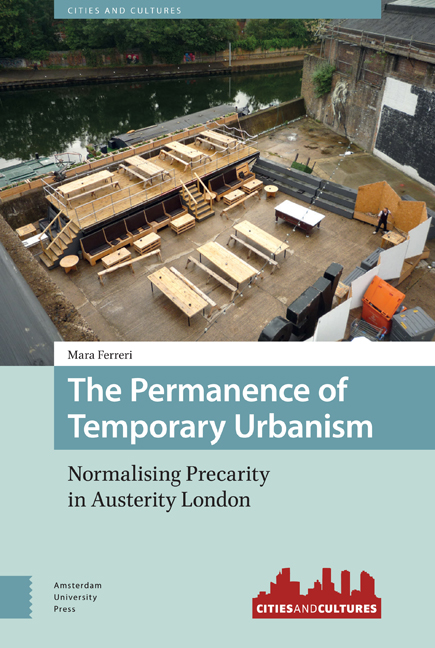6 - The Normalisation of Temporariness
Published online by Cambridge University Press: 13 April 2021
Summary
Abstract
The concluding chapter examines the mechanisms that have normalised temporary urban practices since the 2008 global financial crisis and their relationship to longer-term cultural and economic shifts. Such normalisation combines a narrative construction of vacant spaces as a problem and a celebration of a projective logic of on-demand connectivity. It argues that temporary urbanism has ushered in a deeply problematic glamorisation of impermanence and ephemerality and a new ideal of urban life in which the anticipatory politics of precarity become normalised and celebrated. The imaginary of a ‘festivalisation of urban policy’ reveals an increase in planned spatial and temporal foreclosures in contemporary cities. The chapter concludes by offering a propositional cultural and political critique of temporariness at times of permanent uncertainty.
Keywords: normalisation, vacant spaces, ephemeral, festival, precarity, Planning
…land is often only available in chunks of time.
The rise of temporary urbanism has undoubtedly become a defining feature of the past decade in architecture, artistic practices and urban policy circles, above and beyond responses to vacant and empty spaces. From theatres and community projects to green spaces, shops and art galleries, the ‘pop-up’ adjective has come to embody a normalisation of the temporary as an imaginary of urban inhabitation and urban experience. Performative, transformative, cosmetic: understanding this strand of urbanism requires a thick and situated account of its contested emergence and of the unresolved tensions that continue to inform contemporary urban practice after the pop-up. In this book I have presented contested, multiple, entangled and situated stories about the emergence of temporary urbanism and its development in post-2008 ‘austerity’ London. Through in-depth semi-ethnographic accounts of different places, urban practices and their narratives, I have examined the establishment of the seductive ideal of the temporary city: an urban model that glorifies ephemerality and disruption over continuity and permanence. The ideal was nourished by multiple and divergent cultural genealogies and longer histories of alternative artistic and architectural practices, which have too easily associated vacant spaces and temporariness with the imagined ‘interstices’ of the city. I have called this construct the ‘alterity trope’ of temporary urban practices. To explore this trope as a field of position-taking, I have drawn on situated accounts of ten years of pop-up and temporary practices in London and made the case for the need for a longitudinal analysis of narratives and counter-narratives, policies and performative practices.
- Type
- Chapter
- Information
- The Permanence of Temporary UrbanismNormalising Precarity in Austerity London, pp. 145 - 172Publisher: Amsterdam University PressPrint publication year: 2021



